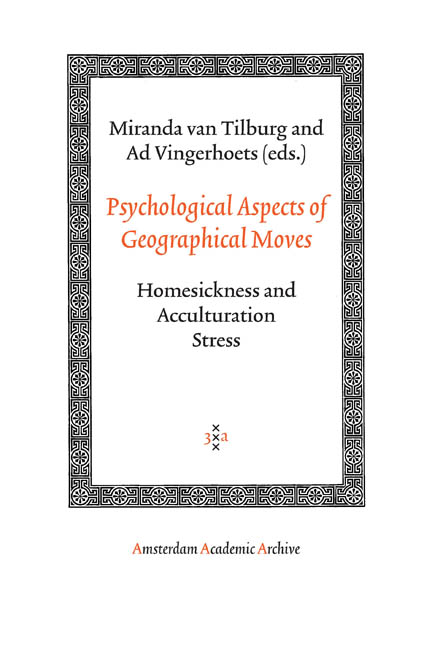Book contents
- Frontmatter
- Preface
- Contents
- Contributors
- 1 The Homesickness Concept: Questions and Doubts
- 2 Culture Shock, Homesickness, and Adaptation to a Foreign Culture
- 3 The Psychological Context of Homesickness
- 4 Geographical Moves and Psychological Adjustment
- 5 Homesickness and Acculturation Stress in the International Student
- 6 Psychological and Psychosocial Adjustment of Migrants: Families in a Changing Environment
- 7 Individual Differences in Acculturative Stress Reactions: Determinants of Homesickness and Psychosocial Maladjustment
- 8 The Cry for the Lost Placenta: Cultural Bereavement and Cultural Survival among Cambodians who Resettled, were Repatriated, or Stayed at Home
- 9 Children's Coping with Homesickness: Phenomenology and Intervention
- 10 Homesickness after Relocation during Early Adolescence
- 11 Personality, Temperament, and Homesickness
- 12 Homesickness, Personality and Personality Disorders: An Overview and Therapeutic Considerations
- 13 Health Issues in International Tourism: The Role of Health Behavior, Stress and Adaptation
- 14 Development of Psychopathology in International Tourists
- Miscellaneous Endmatter
11 - Personality, Temperament, and Homesickness
Published online by Cambridge University Press: 23 January 2021
- Frontmatter
- Preface
- Contents
- Contributors
- 1 The Homesickness Concept: Questions and Doubts
- 2 Culture Shock, Homesickness, and Adaptation to a Foreign Culture
- 3 The Psychological Context of Homesickness
- 4 Geographical Moves and Psychological Adjustment
- 5 Homesickness and Acculturation Stress in the International Student
- 6 Psychological and Psychosocial Adjustment of Migrants: Families in a Changing Environment
- 7 Individual Differences in Acculturative Stress Reactions: Determinants of Homesickness and Psychosocial Maladjustment
- 8 The Cry for the Lost Placenta: Cultural Bereavement and Cultural Survival among Cambodians who Resettled, were Repatriated, or Stayed at Home
- 9 Children's Coping with Homesickness: Phenomenology and Intervention
- 10 Homesickness after Relocation during Early Adolescence
- 11 Personality, Temperament, and Homesickness
- 12 Homesickness, Personality and Personality Disorders: An Overview and Therapeutic Considerations
- 13 Health Issues in International Tourism: The Role of Health Behavior, Stress and Adaptation
- 14 Development of Psychopathology in International Tourists
- Miscellaneous Endmatter
Summary
Introduction
Homesickness is a condition familiar to most people. The main characteristic is the pervasive feeling of sadness that happens universally to all age groups, under conditions of being away from home. Despite the universality of homesickness, little research has been done on this specific condition or its outcomes (Baier & Welch, 1992). Arising from the currently available literature reviews, conceptual analyses and empirical studies are many research questions focusing at antecedents and consequences of homesickness. A major question that should be asked concerns personality factors as preceding factors of homesickness.
It certainly is not a voluminous literature that examines the links between homesickness, on the one hand, and temperament and personality traits, on the other hand. As a matter of fact, only a few studies focus directly on these particular relationships. For instance, dependency, predominantly on family and parents, was found to be a characteristic feature of homesick students (Carden & Feicht, 1991). Also, in a longitudinal study, it has been shown that individual differences in dependency were systematically related to homesickness (Brewin et al., 1989). In a way, these findings suggest a possible linkage of homesickness to separation anxiety.
Of course, dependency is not the only personality characteristic that has received attention of researchers in the field of homesickness. In a group of first-year university students, Fisher (1989) found substantial links between introversion, depression, and obsession, on the one hand, and homesickness, on the other hand. She showed that introverts reported slightly more homesickness experiences than extraverts. She also demonstrated convincingly that levels of depression and obsession were already heightened in homesick persons prior to leaving home, indicating the existence of a vulnerability factor.
Eurelings-Bontekoe et al. (1994) compared homesick military conscripts with groups of normal controls and conscripts with different psychiatric symptoms. They reported the following characteristics of homesick military conscripts: (i) high levels of rigidity, somatization, and introversion, (ii) low levels of dominance and selfesteem, (iii) a high need for social support together with a lack of adequate social skills, and (iv) from an early age onwards, homesick experiences, serious problems with separation from parents, a strong emotional bond with parents, fewer of shorter holidays and stays without parents or alone, and avoidance of dating and going out. Rigidity proved to be the best predictor of homesickness.
- Type
- Chapter
- Information
- Psychological Aspects of Geographical MovesHomesickness and Acculturation Stress, pp. 161 - 178Publisher: Amsterdam University PressPrint publication year: 2006

